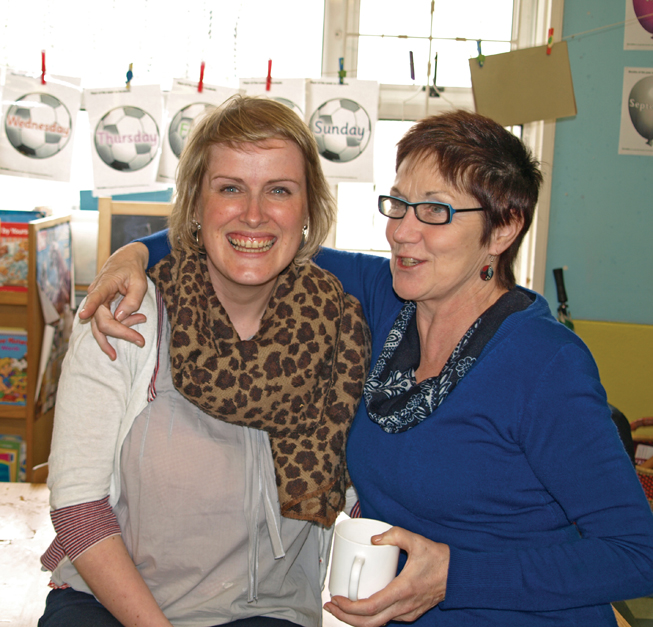
“If you have a good relationship and a laugh with children they’ll respect you more,” says Jane Farrelly, a resource teacher in St. Patrick’s Boys’ National School in Ringsend who deals with children who suffer from a variety of behavioural and learning difficulties.
These include Autism, Dyspraxia, Dyslexia, Universal Developmental Delay, ADD, ADHD, Emotional and Behavioural Difficulties (EBD) and Oppositional Defiance Disorder (ODD).
Of course she’s not alone. Here at St. Patrick’s BNS, dealing with children who have learning and behavioural problems doesn’t just concern the resource teacher, it includes the parents, members of the National Educational Psychological Service and School Liaison Officer Helen Sherry. “Concerns about children can come from anywhere; from parents, the teacher themselves or from someone in the community,” says Helen.
Both Helen and Jane meet me in a colourful meeting room just inside the door at St. Patrick’s. They make up a remarkable team. Helen works with parents, teachers and students to get to the source of a problem and fix it before it becomes a bigger issue. Jane works with students in her class, creating different games and scenarios to ease any bad behaviour or help any learning difficulty.
“There’s a different array of things that could be of concern, from a learning difficulty to behavioural difficulties, where children being challenged by school academically, might try to distract or deter you through behaviour,” says Helen.
In a study conducted in 2011 by the College of Psychiatry of Ireland titled Mental Health Provision for Children With a Learning Disability, there were over 9,000 children between the ages of 0-19 years of age who had a learning or behavioural disability. Those figures did not include children who may be suffering from mild learning or behavioural problems.
“Kids who have problems in this school, and there are a few, have come on great and we really believe in positive re-enforcement and if they do something good we tell them they are fantastic and brilliant. We do our best to ignore the negativity,” says Jane.
Parents are particularly important and are included in all aspects of the child’s progress by meeting with Helen and Jane to discuss any problems that may occur. Helen can work with parents on finding a solution to their child’s problem, depending on what that is.
If the school can’t find a solution to the problem, other services available are; The Dyslexia Association who have an assessment service for children from seven upwards, the National Educational Psychological Service (NEPS) provide a psychological service to children in education, and the National Council for Special Education’s website includes a number of resources addressing a range of issues in terms of learning difficulties.
Information for parents of children with learning problems
There are a number of resources for parents seeking information about learning disabilities. These include:
The National Council for Special Education (NCSE) which supports parents through a number of Special Educational Needs Organisers (SENO) across the country. Each SENO deals with specific schools; primary, post-primary and special education schools. They also provide an online information pamphlet containing information for parents of children who have special educational needs. NCSE is contactable through schools or teachers.
The National Educational Psychological Service (NEPS) supports the psychological developments of children. The organisation works with parents, teachers and children, conducting individual assessments of a number of learning and behavioural difficulties. NEPS Dublin region is contactable through its website education.ie and look for NEPS.
There’s also the Special Education Support Service (SESS). The main aim of the organisation is to help teachers teach children who may have a learning or behavioural problem. Although the website provides information aimed at teachers, it can be used as a resource for parents who want to understand the level of help and support their child is gaining within the Irish education system. Information about the organsation is available through its website sess.ie.
The Dyslexia Association of Ireland works with schools, parents and children to diagnose dyslexia. The association carries out a psycho-educational assessment, which can come at a cost. People who are in receipt of a Social Welfare payment may qualify for a reduced rate.
“There is a waiting list for DAI’s assessment service of approximately three months. We do occasionally get cancellations, so if there is a particular urgency it can sometimes be possible to get an assessment more quickly,” says Harriet Doig, the information officer for the Dyslexia Association.
If a child is deemed to suffer from any other learning problems- other than dyslexia, the association will advise the parents to seek the help of NEPS or their GP.
For more information on placing your child on the waiting list you can contact the Dyslexia Association at info@dyslexia.ie with your child’s name, date of birth, address, and contact number.
By Liam Cahill

